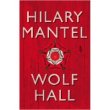 Last night, while feeding my newborn baby at 3.30am, I finally finished Wolf Hall by Hilary Mantel. I feel quite relieved in a way, as it’s been a long time coming. I bought the book when it first won the Man Booker prize in 2009. Everyone was raving about it; it had won a huge literary award; it dealt with a period of history that I love. It sounded like a book I would love.
Last night, while feeding my newborn baby at 3.30am, I finally finished Wolf Hall by Hilary Mantel. I feel quite relieved in a way, as it’s been a long time coming. I bought the book when it first won the Man Booker prize in 2009. Everyone was raving about it; it had won a huge literary award; it dealt with a period of history that I love. It sounded like a book I would love.
I began to read it, but then I gave up. It just didn’t grab me; I found the writing quite dense and the huge cast of characters confusing. I made excuses then put it aside. A few months later, I tried again. Then I tried again for a third time. Finally, I put it back on my bookshelf along with other books that I have abandoned, unread: The Children’s Book by AS Byatt, Moby Dick by Herman Melville, The Street Sweeper by Eliot Perlman. These are all books that I should like, if reviews and prizes and hype are anything to go by, but I don’t.
When Bring Up The Bodies, the sequel to Wolf Hall was released recently, I found myself reaching for it on the bookshelf. I’d read interviews with Hilary Mantel, seen pictures of her at the Tower of London, the place of Anne Bolyn’s execution. The reviews have been fantastic and the hype was huge. But I put it back down again: it was ridiculous to buy a the sequel to a book that I had found unreadable. I was determined to give Wolf Hall one final chance. This time, I flicked to and from the list of characters and family trees at the front of the book, and I concentrated. This time, once I adapted to the voice of the book, it was compelling. It was still challenging, but I loved the style of writing, the complexities and density of the book and the politics and personality of the main character, Cromwell. I certainly didn’t find it an easy read, but I ended up enjoying and respecting it.
 I never would have read Wolf Hall if it wasn’t for the accolades and the hype. I’m glad I did.
I never would have read Wolf Hall if it wasn’t for the accolades and the hype. I’m glad I did.
Thinking of hype and marketing brings me to another book…Fifty Shades of Grey by EL James. I haven’t read this book, and I don’t intend to: it’s just not something that interests me. Friends of mine have bought this book, and many say it’s not very good, but they still read the second and third in the trilogy. Some say the ‘writing’ is poor, and the responses remind me of the reaction to Dan Brown’s The Da Vinci Code or even the Twilight trilogy. There seems to be a need to cut down an author who has sold squillions of books. Is it envy? Is it snobbery?
And so we’re left with the two sides of hype. First, the literary blockbuster that everyone says is brilliant, the thick novel that sits in prime position on our bookshelves, possible unread, because it’s a book that we should read and should like. Second, the book that sells millions and millions of copies on hype and word of mouth, but it’s a book that we feel the need to criticise and tear to pieces. Neither would be as successful without the publicity they have attracted.
With all the concern about the demise of books and the publishing industry, we should be celebrating anything that gets people into bookshops and into the pages of a novel. A flurry of new ‘erotica’ books is now on the shelves in the same way that vampire stories were popular after Twilight. This is good for authors, good for publishers, and good for bookshops. And of course, good for readers who may come across a book that gives them entertainment, escapism and even education.











